#fandom essays
Explore tagged Tumblr posts
Text
Volt's Library | Fandom Essays
Links to the essays, opinions, or little things I've written on this blog. Both long-form and short-form. Mostly fandom-related. Hope you enjoy. :)
— — —
SCAM ALERT | Discord Scam: Impersonating Discord Employees, Be Aware | January/March 2024
An alert post of Discord's prolific scam where scammers impersonate Discord employees through hacked accounts, with a March update.
TWDG | …so about that clementine comic: a (very long, sorry) essay | [17,468] May 2022
An analysis of TWDG & canonicity, as a rebuttal to the Clementine comics by Tillie Walden.
TWDG | …about the clementine comic (again): why is she illiterate? | [9,186] March 2024
Another analysis of TWDG in regards to the Clementine comics (by Tillie Walden), with a commentary of survival and linguistics.
TWDG | ERICSON’S WALLFLOWER: or bpd as a twdg fandom essay, & violet's analysis | [27,991] March 2024
A deconstruction of Violet as a character, and Borderline Personality Disorder, as an exhaustive explanation as to why both her and the disorder are so often stigmatized—with personal accounts.
TWDG | The three (of five) TWDG deaths which haunt me so | [4,299] April 2024
All three TWDG deaths that stick to my mind personally, with a mild analysis of the games (Season Two) to boot.
WEDNESDAY | okay can i say a thing about esther in fics | [Short-Form] January 2024
Esther is a toxic influence for Enid. Yet, the fandom tends to oversimplify what that toxicity is.
— — —
[Updated: May.3.2024]
#volt's library#fandom essays#twdg#the walking dead game#twdg 1#twdg 2#twdg 3#twdg 4#wednesday 2022#wednesday netflix#wednesday show
2 notes
·
View notes
Text
Just realized I can post this. Please watch the ones about social issues omg
#The Harry Potter Ones Are About How Much It Sucks And The “Can You Tell If A Disabled Person Is Faking” One Is About How Bad Fake Claiming I#The Owl House#Neurodivergent Essays#Gravity Falls#Queer Essays#Racism Essays#Fandom Essays#wandavision#Musical essays#Disability essays#Hamilton#Six#Music essays#Cats#Leftist essays#Fashion essays#Warrior cats essays#Cartoon essays#Janus’s Corner
4 notes
·
View notes
Text
Fandom Essay Directory (Pinned)
About time I had a pinned list of these on here~
Full list and links to the posts below the cut, just to keep things tidy~

Raphael Fandom and a general examination of what draws us to villain romance~
The first one I wrote, which is still probably the shortest, but hells help me I have the Gale in me (not literally) when my interests are activated~
Raphael and Asexuality
A deep dive into the realm of the Asexual Spectrum as well as how Raphael and his story can connect to it.
Abdirak and The Intricacies of Pain
An exploration into both Abdirak's character and the complex worlds of chronic pain, acute pain, and the good kind of pain that brings relief from suffering. Contains kink talk~
The Emotional Rollercoaster of being a Fandom Creative
A look at what many of us feel during and after making fanworks, as well as the ways to cope with the drop.
Body Positivity in Fandom
How Fandom can be validating and uplifting~
Tagging and Content Warnings
How to ensure fan works are properly tagged and warned, as well as why it's important to do so to keep everyone safe and happy in creating and devouring fanworks~
Curating Your Fandom Experience
Examining the platforms available to us and how best to use them to connect with people in the ways we enjoy most~
Creating a Fandom Discord Server
A guide to creating and managing a discord server, including safety tips, recommended bots, and how to build the community you want to lead~
Beta Reading Guide - For Writers and Beta Readers
How to give good feedback and how to make the most of beta reading to make your works the best they can possibly be~
Disability Pride Month - Overview and Directory
Masterpost for the Disability Pride essays and an overview of why they were written. Contains links to the individual Disability Pride deep dives on Gale, Karlach, Halsin, Shadowheart, Lae'zel, Wyll, Astarion, and Gortash.
0 notes
Text
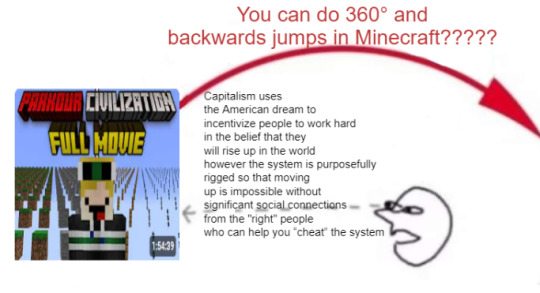
Do you think Evbo learned how to do those jumps and thought "oh this is so sick what's the best way I can show off my parkour skills"
#mcyt#maige's posts#maige's memes#parkour civilization#parkciv#evbo#this is my contribution to the fandom. god i love blond green boys who become burdened with the fate of the world when all they want to do#is be free and have fun#would you believe that i literally have a class discussing the labor movement and rise of communism in early 20th century america that ive#been ignoring bc i was too busy watching this#i have a 350 word essay due actually. oh shit
8K notes
·
View notes
Text
People who try to analyze what happened on Tumblr on November 5th, 2020, often really overstate how much it was actually “about” Supernatural. As someone who has never been in the supernatural fandom ever but dID join in on the hysterical destielposting—it was really more about the stress of the pandemic and the 2020 presidential election.
The two biggest Youtubers I’ve seen try to dissect “what happened that November 5th” in video essays both weren’t American—- and I think that explains why they both tried to explain the hysteria primarily via analyzing the Supernatural fandom/the original show, rather than through the lens of the election. And while those videos are cool, valid, informational, and make lots of really well-considered interesting points— I can tell you that me and almost all my mutuals had literally no knowledge or interest in the fact that “oh supernatural had made nods at the ship in the past but the creators were adamant that I wouldn’t be canon” or etc etc etc etc. the first time I learned about any of that context was way later, watching videos where people claimed that fandom history context (that I did not know anything about) was the actual reason for the hysteria.
But the reality is that people latched on to the Destiel stuff because it was a piece of big useless inane zero-stakes fandom news in a time when we were desperately waiting for serious high stakes election news. We were latching onto a “positive “ piece of inane stupid fandom news in a time of great stress, with all the desperation of a drowning man who latches onto whatever piece of wood will keep him afloat.
The core of the hysteria was that Americans (who make up a huge chunk of tumblr’s userbase) were currently glued to their laptops watching the live presidential election vote counts come in. These vote counts were taking an extended amount of time due to the pandemic causing high numbers of mail-in ballots, resulting in a constant state of Election Day Stress for multiple days straight.
This was also during the height of the Pandemic. People had predicted Trump’s presidency would be bad; no one had predicted it would be this apocalyptically bad. No one had predicted pandemics and lockdowns and hospitals overflowing with bodybags. remember Trump spreading Covid lies and conspiracies?? There were so many Qanon conspiracies about democrats being Satanic child traffickers who had to be put to death, and coup threats were mounting from the right wing side. It seemed like this election was a choice between ‘centrist democrat’ and “apocalyptic right wing conspiracy theory authoritarianism,” in the midst of pandemic conditions that people feared would never ever improve— and it seemed like a close election.
Another major point was that Trump voters were more likely to be antimaskers/Covid deniers, while Biden voters were more likely to take the pandemic seriously— so Biden voters were more likely to send in mail-in ballots instead of risking the in-person voting crowds, which meant their ballots would take much longer to count. And so, in many state electoral vote counts, it would initially seem like Trump was very far in the lead— only for Biden to slooooowly build up an agonizingly small lead as the mail in ballots came in, and then defeat Trump at the very end.
So you’re just watching these news sites giving live election updates, refreshing the page every 2 minutes to see if you’re going to live under a spineless centrist democrat or a literal Qanon Dictatorship. And then you go on tumblr to distract yourself, and there’s more election posting, and more agonizing over the votes, and more stress and despair—-
And then it’s been days and we’re right at the crucial tipping point where it’s anyone’s game and the next few hours will determine whether Trump will win, so you need to keep your eye on the vote count, because the next hours will determine the future of the pandemic and your country and your plans for your entire life—
And then stupid Destiel becomes canon! And it becomes canon in the silliest way possible!
If Destiel had become canon at any other time, it would have been a big goofy tumblr celebration? But we wouldn’t have gotten the insane explosion of hysterical interaction.
The entire core of it was the contrast between the inane meaningless stupidity of fandom news vs the actual stressful election news you wanted to hear! It really is best conveyed in that meme where Castiel says “I love you” and Dean indifferently responds with a piece of important election news.
It’s about the contrast between the low-stakes inanity of fandom and the massive life-destroying stakes of a terrifying election. There really was no reason it had be Supernatural specifically, except that Supernatural was a thing everyone knew basic things about from dashboard osmosis— it could’ve been any other equally huge silly fandom ship news about a ship everyone *knew of* but might not necessarily be invested in (ex. Stucky becoming canon, Johnlock becoming canon, Kirk/Spock becoming more canon somehow, etc etc etc.)
I think it’s true that people who weren’t paying agonizingly close attention to the American election news got swept up in it, and that non American Supernatural fans also were extremely excited for purely fandom reasons — but the entire reason it blew up to an unprecedented degree was because of that core of stressed out terrified Americans glued to their computers watching election results and suddenly receiving stupid fandom news instead, and deciding to just hysterically parodically hyper-celebrate this absurd useless zero-stakes news.
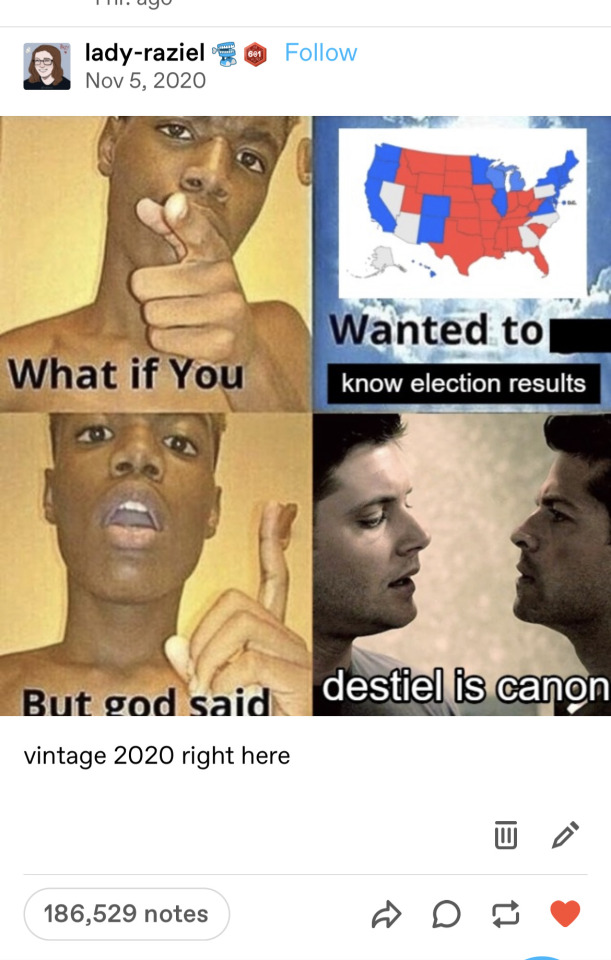
I think it was also all elevated by the fact that, as I said before, this happened at the crucial “tipping point” of the election where the next few hours would determine the winner. The fact that Biden began to slowly develop a lead in the hours after made it feel, hysterically, as if the hours after Destiel became canon was somehow the turning point where he began to win; so celebrating Destiel felt like celebrating that slow turn towards victory.
The tl,dr is that it’s so important to Remember the Fifth of November …..in preparation the inevitable hysteria that will happen in the presidential election on November 5th of next year. XD. Personally I’m rooting for Johnlock or Frodo/Sam to somehow become canon in the eleventh hour right before the democrats win
#November 5th#november 5 2020#the fifth of november#just a random ramble#November 5th 2020 is such an important day to me#it really is a holiday#but it does confuse me when I see people analyzing it primarily as a supernatural thing#instead of a ‘hysteria over an election reaches a breaking point when inane zero stakes fandom news comes out and we all latch onto it’thing#but yeah!!#this is my personal essay out of love for the holiday
22K notes
·
View notes
Text

newfound fave lil creachers
#morning frost#once upon a witchlight#legends of avantris#bitsy uprooted#LoA keeping me sane alongside D20 so i dont have to listen to only video essays on yt every time i work#juggling so many fandoms recently i figured i have to sketch what i can so i dont burnout#i love them your honor#(it's a true detective scene/meme)
4K notes
·
View notes
Text
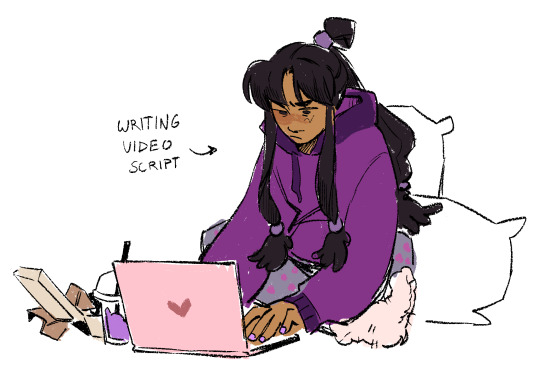
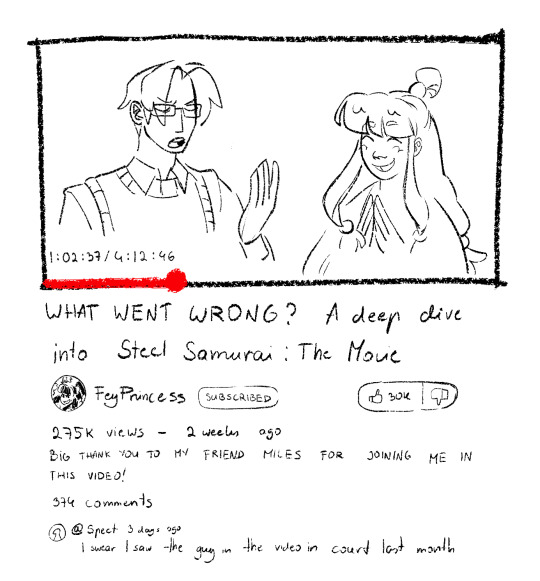
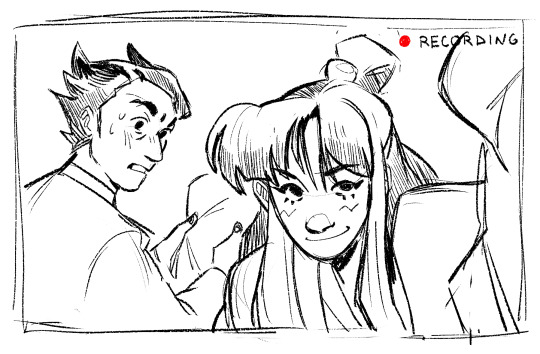
randomly rememebered a very silly maya content creator AU i came up with like 2 years ago. its just dumb fun haha
#this is kind of an extension of my hc/au of having the aa cast be people who grew up in the early 2010s (social media users)#in this au maya is a prolific steel samurai extended universe fandom member and starts making videos in like 2018-2019#edgeworth also posts online anonymously but it takes him yearsss to show his face online#getting a segment in her massive video essay compels him tho#yea im just rambling abt my goofy ideas atp if you wanna know more i can share#maya fey#miles edgeworth#phoenix wright#ace attorney#fanart#art
10K notes
·
View notes
Text
If there's anything I've felt about ace attorney since playing through the original trilogy, it's how cheated I've felt about the fandom interpretation of it. Y'all were so caught up with your gay boys and your Miles Edgeworths I didn't realize how much of this game was about WOMEN. THE CORE OF ACE ATTORNEY IS IN ITS FEMALE CHARACTERS. From Mia jumpstarting Phoenix and guiding him throughout the whole trilogy even after her death, her presence being the primary connecter of Phoenix and Maya, Maya and Godot, heck even Dahlia and Iris and the whole lot of them. From Franziska's earnest faith and consolation of Miles Edgeworth, even begrudgingly, pulling him out the trauma of his childhood with the face to face confrontation of a bullet wound in the same spot as the man who killed his father. Lana and Ema dragging Phoenix back into the thing he does best. Lana and Ema who's tragic story lies in a pair of sisters ruined by the heinous law system and their unconditional love for each other. Dahlia and Iris with a different version of sisterly tragedy, struggling through generational trauma in separate settings and support systems. The matter of the Fey tradition looming over the entire narrative and all the legal and social terror that comes with it. CAN WE TALK ABOUT THE ACE ATTORNEY WOMEN.
#aa#wheat rambles#hai i just realized tumblr user musashi reblogged this#i wrote this post after watching your franziska video essay ty for opening my eyes to franzi's whip stim toy#on a different note idk if I'll ever play the aj triology but if i do it for athena#cause idk what her schtick is and i dont trust fandom enough to tell me#this is a mia fey stan account#i love my wife she haunts the narrative
5K notes
·
View notes
Text
Tiktok's censorship of words like rape, kill, murder, abortion etc. etc. as well as censoring hard to hear topics, over the past few years has deeply contributed to the sanitisation of the internet and therefore directly resulted in the birth of "fandom purists" and the destruction of old fandom culture (the death of "don't like, don't read", "ship and let ship" mindsets as well as safe spaces for dark and "immoral"/unethical storytelling i.e "dead dove: do not eat") in a way that has fundamentally changed the mindsets of people who are new to fandom spaces and now view these such topics as wildly inappropriate for any social space as well as deeming anyone who is intrigued by them narratively or creatively as "immoral" and a bad person. In this essay I will
#sam rambles#im so fucking sick of fansom purists#i havent written an essay in like a year but i feel so strongly about this topic thay i could#i really could write a whole essay on this#fandom#fanfiction#fandom purists#essay
3K notes
·
View notes
Text
In Defense of Shitty Queer Art
Queer art has a long history of being censored and sidelined. In 1895, Oscar Wilde’s novel The Picture of Dorian Gray was used as evidence in the author’s sodomy trials. From the 1930s to the 1960s, the American Hays Code prohibited depictions of queerness in film, defining it as “sex perversion.” In 2020, the book Steven Universe: End of an Era by Chris McDonnell confirmed that Rebecca Sugar’s insistence on including a sapphic wedding in the show is what triggered its cancellation by Cartoon Network. According to the American Library Association, of the top ten most challenged books in 2023, seven were targeted for their queer content. Across time, place, and medium, queer art has been ruthlessly targeted by censors and protesters, and at times it seems there might be no end in sight.
So why, then, are queer spaces so viciously critical of queer art?
Name any piece of moderately-well-known queer media, and you can find immense, vitriolic discourse surrounding it. Audiences debate whether queer media is good representation, bad representation, or whether it’s otherwise too problematic to engage with. Artists are picked apart under a microscope to make sure their morals are pure enough and their identities queer enough. Every minor fault—real or perceived—is compiled in discourse dossiers and spread around online. Lines are drawn, and callout posts are made against those who get too close to “problematic art.”
Modern examples abound, such as the TV show Steven Universe, the video game Dream Daddy, or the webcomic Boyfriends, but it’s far from a new phenomenon. In his book Hi Honey, I’m Homo!, queer pop culture analyst Matt Baume writes about an example from the 1970s, where the ABC sitcom titled Soap was protested by homophobes and queer audiences alike—before a single episode of the show ever aired. Audiences didn’t wait to actually watch the show before passing judgment and writing protest letters.
After so many years starved for positive representation, it’s understandable for queer audiences to crave depictions where we’re treated well. It’s exhausting to only ever see the same tired gay tropes and subtext, and queer audiences deserve more. Yet the way to more, better, varied representation is not to insist on perfection. The pursuit of perfection is poison in art, and it’s no different when that art happens to be queer.
When the pool of queer art is so limited, it feels horrible when a piece of queer art doesn’t live up to expectations. Even if the representation is technically good, it’s disappointing to get excited for a queer story only for that story to underwhelm and frustrate you.
But the world needs that disappointing art. It needs mediocre art. It even needs the bad art. The world needs to reach a point where queer artists can fearlessly make a mess, because if queer artists can only strive for perfection, the less art they can make. They may eventually produce a masterpiece, but a single masterpiece is still a drop in the bucket compared to the oceans of censorship. The only way to drown out bigotry and offensive stereotypes created by bigots is to allow queer artists the ability to experiment, learn through making mistakes, and represent their queer truth even if it clashes with someone else’s.
If queer artists aren’t allowed to make garbage, we can never make those masterpieces everyone craves. If queer artists are terrified at all times that their art will be targeted both by bigots and their own queer communities, queer art cannot thrive.
Let queer artists make shitty art. Let allies to queer people try their hand at representation, even if they miss the mark. Let queer art be messy, and let the artists screw up without fear of overblown retribution.
It’s the only way we’ll ever get more queer art.
_
Like this essay? Tip me on Ko-Fi, pledge to my Patreon, or commission an essay on the topic of your choice!
2K notes
·
View notes
Text
one thing that i find interesting is that even though we never get to interact with Marika directly, only knowing her via obscure cutscenes and other characters' dialogue... she actually displays a wide range of emotions as much as any other NPCs.
her statues depict her as having a warm, gentle smile:
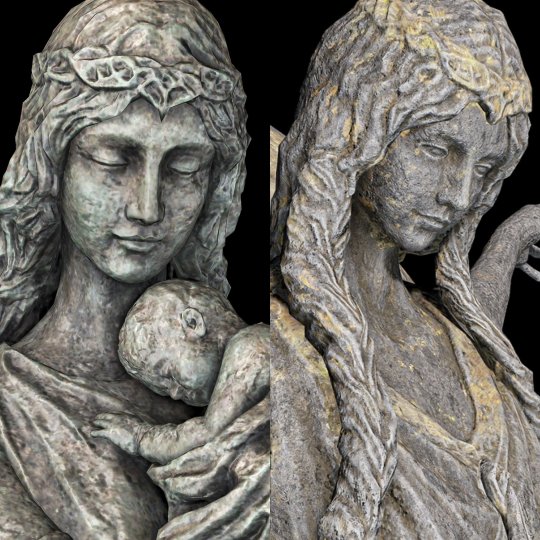
the Mimic veil description points to her playful, mischievous side:
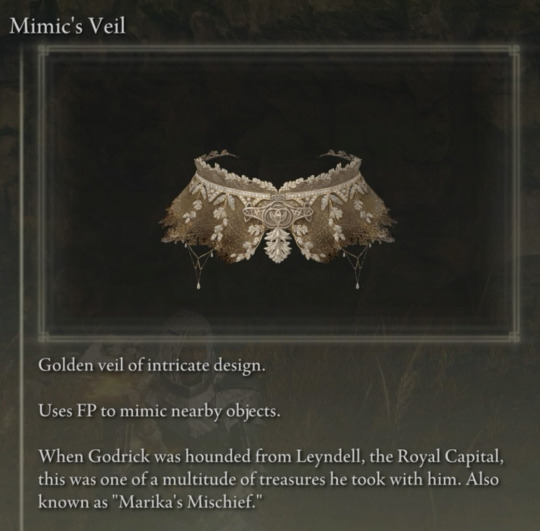
(it's a popular theory in the JP/Asian side of the fandom that it's sth from her childhood - hence the "Marika's Mischief", not "Queen Marika's", and she used it to escape the grisly fate befalling her family.
additionally, its equivalence in Dark Souls is also something described as "the mischief of a young girl who sought relief from the solitude of the woods at dusk", aka Princess Dusk who hails from "Oolacile, land of ancient golden sorceries", but i digress)
her portrait, the story trailer's "Queen Marika was driven to the brink" and Gideon's dialogue after the player defeated Malenia pointed out her sorrow:

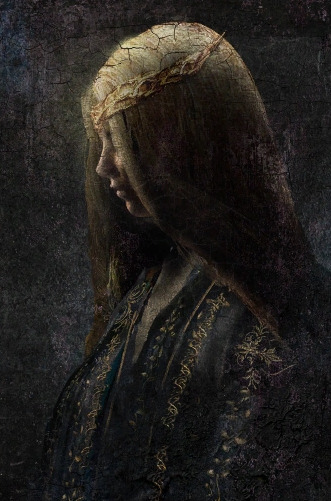
(back when i first played the base game, this is the portrait that drove my eyes most in Roundtable Hold. i kept gazing at her - the Queen with permanently lowered eyes, and thought "there is a girl in there")
The bat lady's song, Messmer's entire Crusade, all those conflicts to establish the Erdtree, shows her anger, and the cruelty she's capable of:

Then there's Shaman's village, the clinic underneath Shadow Keep, the golden braid, the Minor Erdtree, the sealing of Death - that points to grief, trauma, survivor guilt, kindness, and the ruinous drive for revenge that results in the above path down hell:

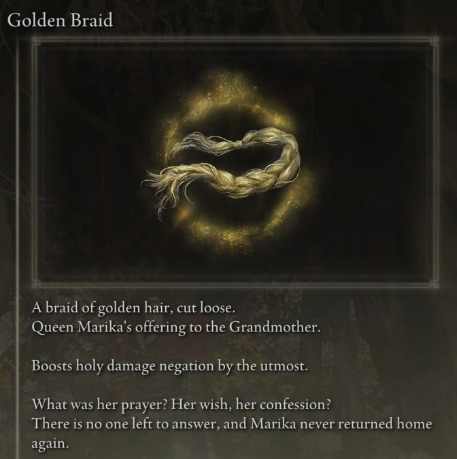
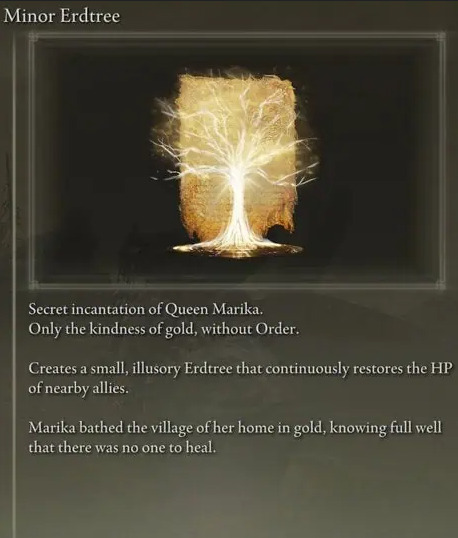
(there's also a theory for the Crusade's headless statue being a reminder for the Hornsent of what they put Marika's mother through, but it's not concrete canon so here is the link if you want to check it out)
The fact that all of Erdtree's incantations are heal and protection spells (with only one exception of Wrath of Gold spell which was found after the Elden Ring was shattered), the Capitol's Perfumers originally being blessed healers, and that all Erdtree blessings come in the shape of tears give the picture of Marika's gentle wish at the beginning: to heal everything and everyone.
(and to me personally, there's a kind of vulnerability and honesty in showing your tears to the world and let it be your power to heal at the same time.)
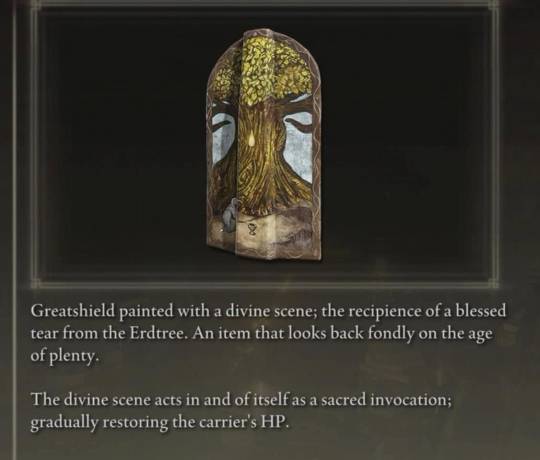

the eye she blessed Messmer with (i do think the Eng translation at some part lost the sentiment of the JP text - that the eye is always referred to as a blessing)
the blessing flask that - unlike its Dark Souls equivalent (which ranges from 6-13 flasks), only have 4 available to us player, heal all ailments and status effect, and specified as sth made for Messmer.
the Marika's soreseal in the Haligtree + the waterfall near Godwyn's final resting place
the Regal Omen Bairn (that was fashioned after the Jizo statue - sth made by grieving parents wishing for protection for their deceased child in the afterlife)
the blessing, gifts, equipment that Messmer and Godwyn's personal knights all get
the fact that Marika's bedchamber and the Impaler's Catacomb (which is the only catacomb in the base game to have the spike trap mechanic used in catacombs in the DLC) remain the proof of Messmer's existence in the base game
how Godwyn's ending is the only ending where the mending rune is placed on the position of Marika's womb (the lower arc or the Elden Ring - also referred to as the basin in which its blessings pool)
that's a whole barrage of motherhood. the love, the fear, the postpartum depression, the guilt and anxiety, (the occasional scheming for revenge with her son). and despite how flawed and tragic that love ends up being for all of them, it is there.
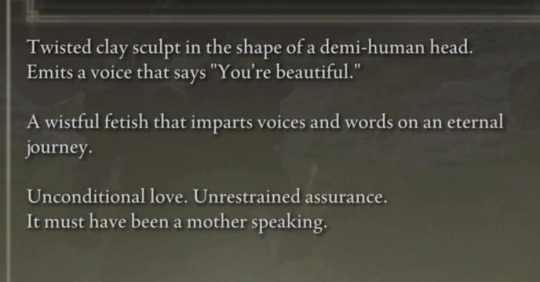
(there's a whole subplot about how Messmer is the only demigod to be called ugly in-game (Hornsent npc dialogue) while Boc's questline is about how his mother being the only one to always assure him he's beautiful, despite everyone else calling him ugly. and how each NPCs questline does reflect a wider theme seen in Marika and her children. but again, i digress)
every time i think of her, Marika is a constantly shifting kaleidoscope, holding everything from within (the beauty and the malign, light and dark, birth and death, she's warm and gentle, she's cruel and unjust, she's strong and kind, she's weak and resentful, she's sweet and she's bitterness made flesh)... and i could only stand there and admire it all.
#elden ring#queen marika the eternal#my uwu baby with a disorder#every time i do the ending the only thing in my head is “to you who bloomed and fell away as a fruitless flower. farewell”#she got me writing essays like the average fandom male character analysis :)#messmer the impaler#er brainrot#golden doomed mother and son#ending this year with another marika rant like god intended
796 notes
·
View notes
Text
Meta Monday: Your favorite fic author is probably over 30.

In 2017, Tumblr user Xochiquetzl posted an essay in response to discourse about adults in fandom, discussing ageism in fandom and explaining why “your favourite fic author is probably over 30”.
The essay seemed to strike a chord with fans and inspired many to share their own positive stories about their experiences with older fans and the fanworks they created.
Are you curious about this essay? Read more on Fanlore!
-----
We value every contribution to our shared fandom history. If you’re new to editing Fanlore or wikis in general, visit our New Visitor Portal to get started or ask us questions here!
#fanlore#your favorite fic author is probably over 30#ageism in fandom#age discourse#meta essay#fandom meta#meta monday#graphic by hheyhalley#text by castille
831 notes
·
View notes
Text
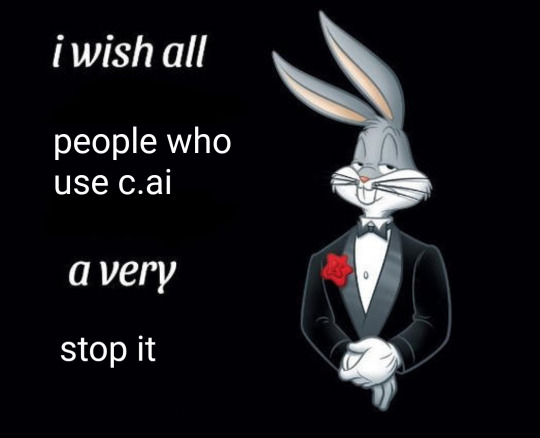
In case I wasn't clear.
#probably gonna lose some followers from this but idc#im gonna stop myself from writing an essay but it's getting increasingly alarming how normalized using c.ai in fandom spaces is becoming#roleplay with your friends like nature intended homies.#like um. stop it. why is ai art bad and shunned (rightfully so) but using c.ai okay. why is using ai meme voices ok. stop it.#clay posts#c.ai#anti ai#fandom
1K notes
·
View notes
Text

Gryffindor Common Room, 1973
please do not repost my art
#marauders#marauders era#marauders fandom#mwpp#moony wormtail padfoot and prongs#moony#wormtail#padfoot#prongs#remus lupin#sirius black#james potter#peter pettigrew#dead gay wizards#my art#oh my god#according to my video essay I drew for 2.5 hours straight#there is so much red in this image holy shit#I was out of my mind trying to make it all not blend into each other and I failed#harry potter#harry potter fanart#hp#hp fanart
777 notes
·
View notes
Text
the day that people realise that not one person in the rachel/percy/annabeth love triangle is deserved to be hated on or was in the wrong and that all three of them were just scared and confused teenagers is the day that humanity will be fully pure, I'll tell you that.
#I can and will elaborate#i will write essays#percy jackson#pjo#annabeth chase#rick riordan#pjo fandom#percabeth#pjo tv show#percy jackon and the olympians#pjo tv series#pjo series#rachel pjo#rachel elizabeth dare#pjo headcanon#the last olympian#heroes of olympus#percy jackson series#rick riordanverse#pjoverse#pjo hoo toa#percyverse#pjo hoo toa tsats#hoo#rrverse#percyjackson#percy pjo#percy series#percy and annabeth
2K notes
·
View notes
Text
Sonic is fundamentally unrelatable and unrealistic - and that's a good thing
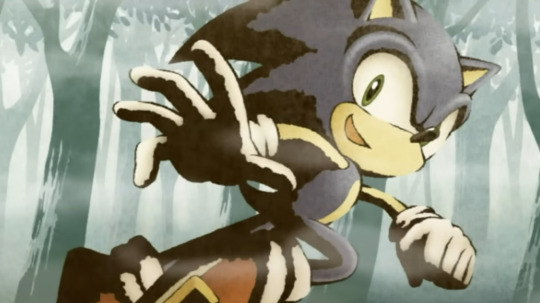
I want to address a common sentiment in the fandom that I've seen countless times over the years - the idea that Sonic should be more humanlike. Specifically, the idea that Sonic should have more human traits, such as anxiety or insecurities, that make him emotionally vulnerable in some way.
I have always felt that this sentiment strips away what I love about Sonic so much—that it goes against his character as someone who is meant to be inspirational rather than relatable. From the bottom of my heart, I truly believe that making Sonic more relatable ruins his appeal and misses the entire point of what role he is meant to fulfill. Sonic being the way he is, an inhuman being that is extremely strong and unyielding mentally and emotionally, makes him an inspirational character that is appealing outside of the realm of relatability.
Please note that I am discussing Game Sonic for this essay, not any versions of Sonic from spinoff media.
(Special thanks to @blurredblu for helping me write this essay!)
Relatability =/= likeability
First, it is important to define "relatability" for the rest of the essay, as what is seen as relatable can vary across countless different cultures and lifestyles.
In this case, we are discussing facets of the human psyche. Traits such as emotional vulnerability, insecurity, or trauma are traits seen as humanlike because they imitate the depth of the human mind. They come across more realistic, and thus relatable to people in real life who have generally gone through emotional hardships.
Relatability is also considered with the implied audience in mind, according to Craft in the Real World by Matthew Salesses.
If relatability were somehow a goal of craft, then the question should be: How can a writer go about trying to make a piece of fiction relatable? If we mean “relatable” as sharing a reader’s experience, the first place to go is audience. We must always ask: Relatable to whom? Which brings us back to the elephant in the room—to call a manuscript “relatable” is really to make a claim about who the audience is or should be.
When writing relatability in fiction, what is important to recognize is who the target audience is. Sonic is a character that was initially created to appeal to a wide target audience, not only meant for young boys but for girls, women, and an older age range in general. When it comes to marketability however, Sonic is almost always advertised towards children, and this demographic is the most pertinent when we look at versions of Sonic written with relatability as a goal. With this idea of the target audience in mind, a character who is portrayed as young and having a childish temperament would be more relatable. The Paramount Sonic movies are a great example of a version of Sonic explicitly written to be relatable to the target demographic on a broad level, heavily influenced by the culture that the movies derive from: specifically a middle-class, suburban, small-town vision of American life. Sonic is portrayed as dependent, inexperienced, and abiding by a nuclear family structure who idolises many elements of American popular culture, such as Keanu Reeves or Marvel/DC superhero comics. Compare this to the games, where Sonic is shown to be self-supporting, wise, and living life as an unfettered vagabond, all without a trace of any pop culture utterances.
In other words, Sonic was created to be the height of unrelatability to his target audience.
It is not lost on me that the prevalent desire for Sonic to behave realistically ties into the idea that the goal of crafting a good character is to emulate realistic human characteristics. A character's relatability is what allows audiences to connect with the character, which is considered unequivocally a good thing.
What is forgotten in this rudimentary line of thinking is that characters in media need to fulfill a role. Characters are not people like you or me, but fictional creations made to serve a particular purpose. There needs to be thought put into what narrative role the character fulfills and why they are portrayed a certain way to the audience. Hence, there must be a reason for the relatability, instead of employing it haphazardly.
To quote Craft in the Real World once more:
"readers’ expectations for fiction are created by their previous experiences with fiction—in other words, by culture."
The desire for Sonic to be relatable can be attributed to people recognizing pervasive tropes present in their previous experiences with fiction, internalizing these commonalities as the correct way to write good stories, and assigning these to Sonic as a result. While I can understand the logic behind this thinking, it is crucial we don't limit our appraisal of media by saying a protagonist ought to abide by a certain limitation, when it's the breaking of rules, however rigid they are, that allow for different methods of storytelling. Sonic breaks the so-called rule that a protagonist must be relatable, and it's this unrelatability that enhances and strengthens the narrative in many Sonic games. In other words, writing Sonic in a relatable way can be a way to write him; that does not mean it is the only or correct way to do so.
We should bear in mind that there are usually financial incentives to cast characters as mentally or emotionally relatable to audiences. To create a protagonist that appeals to all audiences to maximize revenue, the solution is typically to make them broadly relatable. While this can be a successful formula, it is important to not apply it to media indiscriminately. If a myriad of works all prioritise having characters be relatable over what makes them unique, you may end up sacrificing creative integrity for the sake of following a trend. In Sonic's case, you would lose the inimitable appeal that makes him stand out. While relatability can be valuable in certain contexts, it should not dominate all other considerations of writing a character, especially when it is done for the purposes of profitability as opposed to earnestly conveying a character to, ultimately, tell a story.
What makes Sonic stand out
What, then, makes Sonic stand out as a character? His inhuman mental fortitude. In a wide and varied cast of characters such as the Sonic cast, each with their own unique emotional struggles, Sonic stands out as the sole character with no struggle. He has no weak point, no Achilles' heel. Though he is weak to water, that is only a physical weakness. Mentally, he is too strong for anything to affect him long-term.
As stated before, characters are designed to serve specific creative purposes. In Sonic's case, his striking mental resilience is to highlight other messages and characters in the story. This is because Sonic usually plays the guiding or support role in his stories. He is not the sole focus. There is always at least a second character that the story focuses on to highlight that character's problems and struggles, and how that character ends up overcoming that conflict, often with Sonic's help.
With all this in mind, would Sonic stories be improved if Sonic was, instead, a human-like character with human flaws and insecurities? Or would this muddy his core concept and require all Sonic stories to be changed unrecognizably to fit this new, different character?
Sonic has no backstory - and that's a good thing
Understand that this section is not an attack on backstories in general. For the most part, backstories provide insight into a character's motivations and personality. They are effective in accomplishing what they were meant to do - creating characters that are meant to be realistic.
Sonic is not meant to be realistic.
Yuji Naka once stated the reason behind Sonic's lack of a backstory in an interview: if you uncover all the mysteries, then the character will become uninteresting.
Very little information of Sonic's backstory has been revealed. We know that he is from Christmas Island (same interview link as above) and it is implied in the Sonic 1 manual that he and Eggman already know each other and have been regularly tussling before the events of the first game. These are vague and unspecific details that are not brought up in Sonic games at all, and for good reason.
Distance is required to portray a character who you are meant to be separate from rather than analogous to. Maintaining a certain level of mystery around Sonic creates intrigue, as a question is begged but never answered or even brought up in Sonic stories. This is because Sonic's backstory has no relevance on the narrative and delving into it is not necessary.
Sonic's motivations are simple and straightforward. He likes to run and go on adventures because it's fun. He likes to help people not out of some heroic obligation but because he wants to do what he feels is right. There is no need for a backstory to explain Sonic's motivations when they are plainly presented to you in such an uncomplicated manner, and what's on the face of it is just wholly what it is.
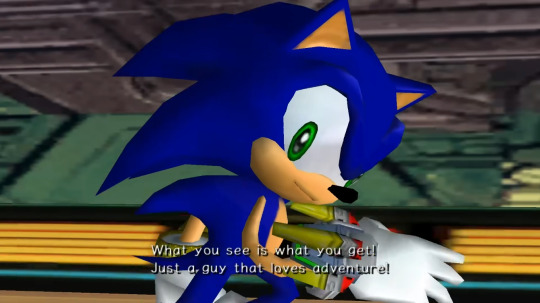
Sonic is also a character that remains static rather than having a major character arc. While he can grow when it comes to things that don't affect his overall character, such as Sonic learning and overcoming Shadow's Chaos Control technique in Sonic Adventure 2, he has no emotional conflict to overcome. He has been a fully realized character since the beginning of the franchise.
Compare this to a character like Tails, whose character arc is about him being bullied for his two tails in the past and being inspired by Sonic to be more confident in himself, as communicated in the Sonic 2 manual and his Sonic Adventure campaign. Divulging Tails' backstory is necessary for the improvement of Tails' circumstances and confidence levels to be effectively communicated in the story.
Fictional characters are narrative devices created to tell a story. They are not real. Again, there must be narrative reasons for them to be the way they are.
Providing Sonic's backstory would serve no narrative purpose—none that would serve the themes his stories and character are meant to serve, at any rate.
Sonic has no trauma - and that's a good thing
Upon analyzing Sonic's character in the games for so long, it has become astoundingly clear to me that Sonic does not have an ounce of mental trauma from everything he has been through. This should not be seen as a bad thing, but rather a well-thought-out and deliberate decision that serves to reinforce the role his character serves.
In the face of situations that would be considered stressful or traumatic to the average person, Sonic remains unfazed and even excited. There are countless examples of this: Sonic jumping from a plane with nothing but shrapnel to use as a surfboard in Sonic Adventure 2; Sonic expressing excitement that he's near an active volcano spewing lava in '06; Sonic exuberantly grinding over pits of lava in Black Knight; Sonic burning up with excitement at the prospect of dangerous stakes in Team Sonic Racing while everyone else seems to be concerned.
For Sonic, danger and near-death experiences are not a source of emotional struggle, but rather a source of fulfilment and joy. He lives life on the edge; the excitement of diving off of a plane or nearly falling into lava only fuels his love for life.
Additionally, Sonic also enjoys the simpler pleasures of life. Exploring the world. Reading books. Going on relaxing vacations. Racing through open fields. Life is one big adventure and Sonic is having a blast living it.
The idea of Sonic having some kind of secret, hidden trauma that he hides under the guise of a fake smile can be a fun fanon trope, but, for the purposes of canon and official Sonic stories, there are clear reasons why they should stay as fanon. If Sonic had trauma, it would undermine his unrelatability and make no sense given his role in his stories. Tropes such as Hurt/Comfort and Angst are ubiquitous when it comes to fandom culture, and this could be a case of those tropes appearing in the Sonic fandom simply due to the nature of fandom itself. Enjoying fanon in and of itself is all well and good, but advocating for it in canon will homogenize it by stripping away what is unique about the media we love.
In the end, there is no reason to believe that Sonic pretends or does not behave genuinely when it comes to expressing his true emotions. Sonic simply has nothing dark inside of his heart to hide. This is confirmed in Unleashed, where Sonic's heart is strong enough to resist the negative emotional forces of Dark Gaia without him even realizing. The subconscious nature of the action combined with his humility even leads him to initially think it to be Chip's doing. His heart is so strong and so pure that it is incorruptible by negative forces. This shows how Sonic's resolve is effortless and practically baked into who he is.
Sonic's internal strength is completely unconscious on Sonic's part. He doesn't actively try to be the way he is. He just is.
Sonic doesn't cry - you get the idea
It has become a hot topic in the fanbase in recent years that Sega once provided a revision note for Sonic to not express excessive emotion such as outwardly crying or sobbing.
This idea has generally been met with hostility and aversion from fans. However, this negative reaction has always confused me, and I hope to offer a different perspective to the issue.
Why does Sonic need to cry?
Let's expand on this argument for fairness' sake. A common rebuttal grants that Sonic doesn't usually cry. But in extremely emotionally difficult situations, such as loss or mourning, Sonic should cry because it is only natural to cry in such a situation.
Again, I want to challenge this notion. We could approach it from the angle of human psychology and behaviour—it is far from the case that everyone cries in response to severe adversity, belatedly or otherwise—but instead I want to explore this with respect to the narrative angle we have covered so far. Specifically, with respect to the idea that characters, unlike you or me, are designed and portrayed with certain purposes in mind.
Why would it be natural for Sonic to cry?
To help understand Sonic's handling of loss, let's analyze four examples from the series of Sonic losing someone.
In Sonic Adventure 2, Sonic stays strong and composed right after Shadow's presumed death, paying respect to his fallen ally.
In Sonic Unleashed, after Chip leaves him, Sonic takes a deep breath before moving forward with a smile on his face.
In Sonic Battle, Sonic is desperate for Emerl to live and expresses this openly.
In Sonic '06, Sonic expresses a great amount of despair when Elise dies in an explosion aboard the Egg Carrier.
It is clear from the outset that Sonic is not an uncaring individual - he wouldn't do all the selfless things he does if not because he didn't care about people. He also still feels strong emotion at losing those close to him, but he handles those emotions with a great deal of fortitude. In Adventure 2 and Unleashed, his reaction is more subdued, while in Battle and '06, it's clear that Sonic is upset and isn't afraid to show it. The difference could be due to that in the prior examples, Sonic watched them die in front of his eyes, while in the latter examples, they were already gone by the time we see Sonic's reaction.
Nevertheless, Sonic feels emotion. It is only because he does not express himself in an adequately typical way that this idea is met with so much outrage and pushback. Because Sonic does not cry, and because an expected response in certain scenarios would be to cry, it is perceived as a writing mistake that must be fixed. Sonic is perceived as a bad character because he does not fit into a rigid box of socially acceptable expressiveness.
But why is Sonic acting outside the norm necessarily a bad thing? The fact that Sonic can go through such hard situations and remain positive is a testament to his strength. The fact he doesn't cry makes him come across as superhuman when it comes to mental fortitude. That is not a mistake of his character that needs "fixing." That is the entire point.
The animosity towards the idea of Sonic not crying, that he must express himself a specific way, a distinctly normal and humanlike way, is stirred from the irrational, yet sadly common, leap in logic that Sonic must behave and experience life like you or me.
There is an irony, too, to how localised this demand of realism is of Sonic. I've seen no outrage demanding that he spill blood or break bones like us. But, apparently, he must shed tears to be a good character. Sonic is superhumanly resilient while running, or fighting, or taking on the miraculous powers of the Chaos Emeralds. Chaos is power and power is enriched by the heart. Sonic's is shown to be one of the strongest and purest out there, one that moves ever on from and through the pain of loss, grief, and tragedy. Isn't it bizarre, then, that this is considered a defect to him?
The messaging of Sonic
Sonic's core concept as an inspirational character must be maintained because it is key to the emotional messaging of nearly every single Sonic game.
Right from the very first game, you play as a plucky little hedgehog, fighting against the tyranny of Eggman's industrialization threatening to destroy all life on the planet.
Sonic is small and unassuming. But he fights anyways, determined to stop Eggman. And he does.
This concept remains throughout the franchise. Sonic always remains steadfast in the face of great adversity. From Sonic CD's "You Can Do Anything" vocal theme telling the player to believe in themselves to simple yet motivational phrases—ones that Sonic himself has given to the likes of more normal characters such as Elise: "If you have time to worry, then run!"
There is even a quote on the Japanese box art of Sonic & Knuckles comparing Sonic to the Sun, the far and unreachable star in space that our entire galaxy revolves around.

We look up at the Sun like how we look up to Sonic.
As brought up earlier, Sonic is the antithesis of relatability to his target audience, children.
This is because he is meant to inspire children.
The fact that Sonic remains so popular and successful to this day is undeniable proof that relatability is far from a necessary ingredient for likeable characters. Given the fact that Sonic is such a strong-willed character, that he fights endlessly against adversity with a smile on his face, that he always gives positive words of encouragement, is it any wonder why he is so popular with children? Sonic is a wonderful role model that promotes living life to the fullest. Sonic is deceptively wise, seeming to know simple yet effective solutions to every problem. Sonic encourages you to chase your dreams, to stay strong through hard times, to enjoy life.
Sonic is a friend who is always there for you.
Not only does Sonic provide guidance to characters, he provides guidance in the real world as we navigate our lives and the trials and tribulations that come with them. Each character that presents a problem is the character we are meant to connect with, and Sonic is who we strive to be.
CONCLUSION
I do not hold any grudge against relatable characters. I love them, just as I love all kinds of different characters in all kinds of media.
I believe that coexistence is possible. I believe that you can praise a character for their relatability and realism, just as you can praise a character for being the antithesis of both of those things, and these do not have to be contradicting principles for one to have. It all depends on a character's narrative function and how their character traits – both relatable and unrelatable – serve the story that is being told.
Sonic the Hedgehog is a character whose role in the narrative is to inspire and guide other characters. From a Doylist perspective, he represents the prominent, all-embracing messaging about staying strong and positive despite all odds, inspiring and guiding his target audience.
Every decision put into Sonic's character traits serve his role perfectly. Of course this extraordinary character does not behave like you or I do. Why would he? That's simply not his nature; a gust of wind in the breeze, moving endlessly all throughout the world. A pure and positive heart who has achieved the innate desire of all humankind in a way that we will never truly understand, free from the burdens of human nature. Freedom.
Sonic is unrelatable and unrealistic. And he is an amazing character.
#sonic the hedgehog#sonic#essay#sonic characterization#sonic fandom#long post#sonic analysis#my first time writing and posting an essay online about sonic!#i've come to realize that people may actually be interested in what i have to say#and i am very passionate about sonic so this was a great exercise for me
406 notes
·
View notes